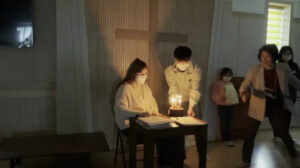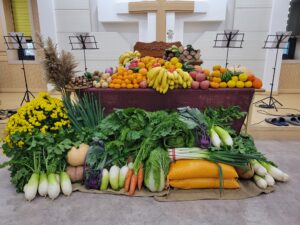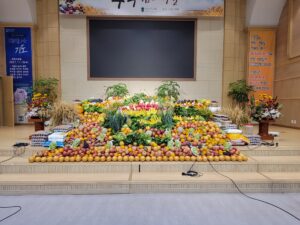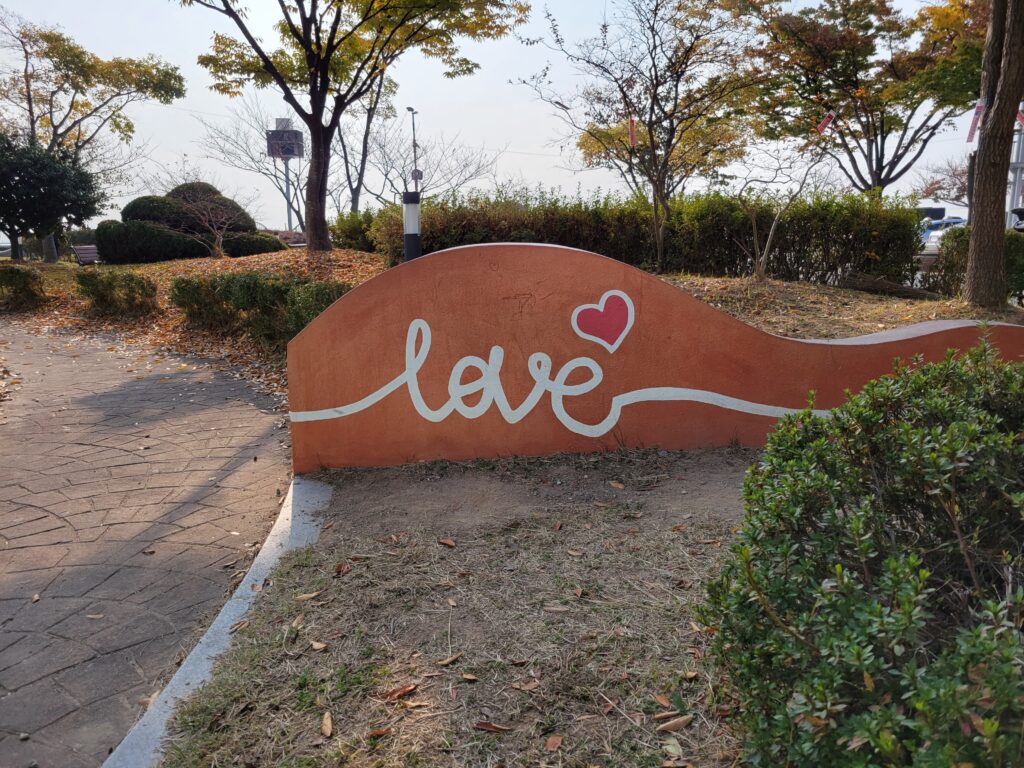Thankfulness and a Blessed Harvest
Abigail Reed serves with the Presbyterian Church in the Republic of Korea (PROK).
1 The Lord is my shepherd, I lack nothing. 2 He makes me lie down in green pastures, he leads me beside quiet waters, 3 he refreshes my soul. He guides me along the right paths for his name’s sake. (Psalms 23:1-3)

On November 7th, Yangmuri and some other churches around South Korea celebrated Thanksgiving. The idea of Thanksgiving in Korea began in 1904 when an elder within the Presbyterian church recommended designating a day to give thanks to God for the prosperity of the Christian church in Korea. Initially, this day was a religious liturgical holiday to collect special offerings to send to missionaries. The purpose of giving thanks was to give thanks to missionaries, specifically the first missionaries on Korean soil. Since then, the meaning behind it has been adapted into a more general thanks to God and the yearly harvest. Between the years 1904 and 1914, the exact date on which the holiday would be celebrated continuously changed between different weeks in November. Nowadays, churches typically observe Thanksgiving on the third Sunday of November, however, the date fluctuates depending on the congregation.

South Korea is a collectivist society that revolves around the close connection and inclusion of others. This ideology was present in the way Yangmuri’s congregation celebrated the holiday. Throughout the week leading up to Sunday, congregation members donated an abundance of fruits and vegetables to decorate the altar in the main sanctuary as well as youth worship rooms. This food was later donated to students, staff, and other congregation members. I briefly mentioned early on to my coworkers that my grandmother was a part of the altar guild committee at my home church in the States. Upon remembering this, they asked me to help them arrange the donated food. Being included in this simple task allowed me to take note of how interconnected everyone in this congregation is, as well as realize how thankful I am to be a part of this community here in Haenam.

The title of our sermon that Sunday was 감사 which translates to gratitude, appreciation, and thanks. A quote that resonated the most with me on this day was, “All things that we can do is ‘thanks’ to God.” In the weeks leading up to this sermon, Rev. Kim had been preaching on the topic of faith and what that truly means. A series of questions that had been arising were: Are you thankful to God? If so, when? Only the following hardship? Joyous times? Do you have faith that God will provide the best for you in all instances? The answer we were provided is that giving thanks to God is the climax of our faith. When we give thanks to God, we are acknowledging all of the things They have done to provide for us in our lifetime. This answer reminded me of an Instagram post made by @blackliturgies, “Some of us have learned to only encounter the divine through our pain. Be wary if your spirituality is all death and no resurrection.” It is natural for people of faith to give thanks to God when someone is healed of an illness or overcomes a large struggle. These times of distress allow us to see God’s presence in our lives more clearly. However when life is going well for us, giving thanks to God seems to come as an afterthought, if it comes at all.

When we say thanks to God, They give us more to say ‘thank you’ for. A few things my co-workers and I are thankful for here in South Korea: 1. Good health to continue God’s work sincerely while applying Jesus’ teachings in my daily life and work, 2. Being able to work alongside good co-workers, 3. Having a good church and congregation, 4. This opportunity to continue to grow in my faith, 5. Opportunities to experience different cultures and entertainment.
As many of us near and far enter this holiday season, I ask that we take time to think about when we are giving thanks to God. Then go even further and ask ourselves, “how do I practice thankfulness in my daily life?”
Abigail Reed serves with the Presbyterian Church in the Republic of Korea (PROK). Her appointment is made possible by gifts to the Disciples Mission Fund, Our Church’s Wider Mission, and Week of Compassion and your special gifts.

